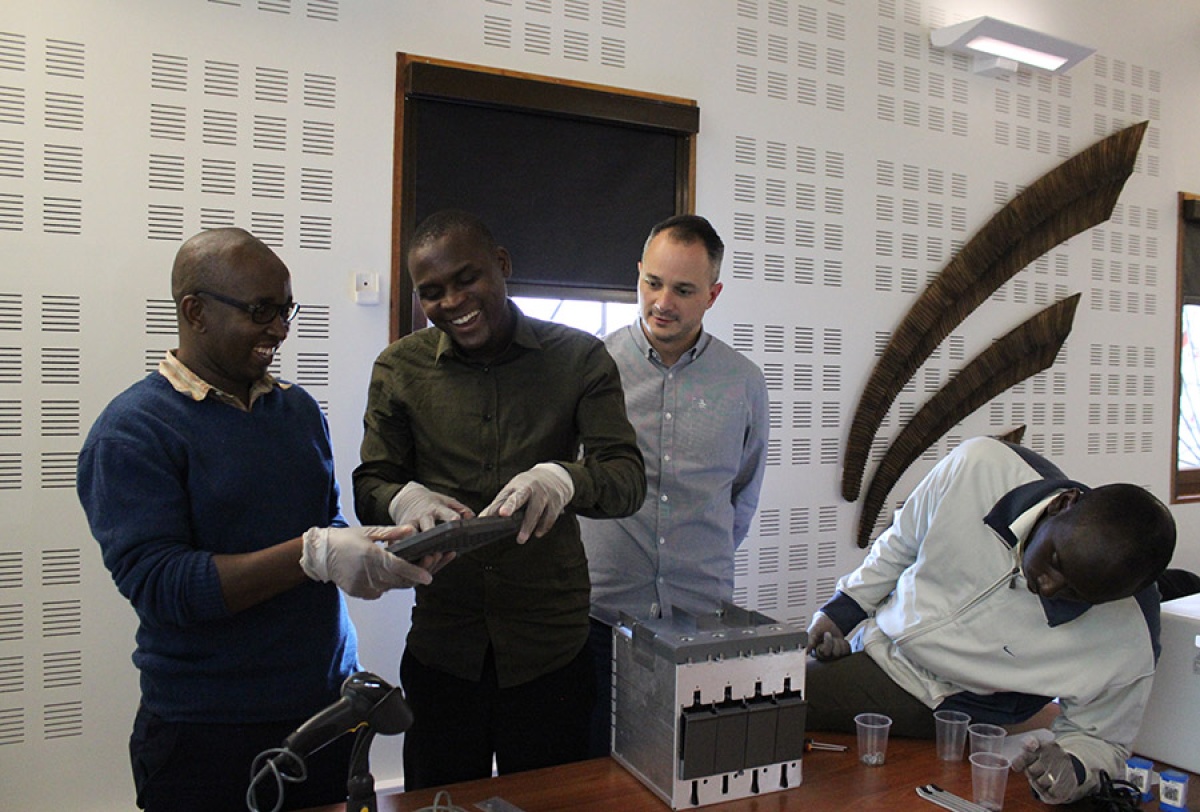PIH Hosts First Cross-Site Lab Training
Posted on Jul 10, 2017

It was a logistical and technical feat that had never been pulled off in Partners In Health’s 30-year history. Eleven staff members from eight PIH sites around the world arrived in Toulouse, France, for a week’s worth of training on everything from standard operating procedures to complex diagnostic exams for tuberculosis, HIV, and chronic myeloid leukemia.
PIH Director of Labs Daniel Orozco saw the week’s sessions as an opportunity for technicians to meet face-to-face, share their expertise and strengthen lab skills, and create a network of support they can use in the future to troubleshoot particularly tough cases.
The training, which was co-funded by the TB Care II project and made possible through the United States Agency for International Development, was split into two focus areas: basic laboratory procedures and an intensive course on GeneXpert—a rapid molecular test created by Cepheid Inc., headquartered in Toulouse, that is used to diagnose and monitor the treatment of a range of diseases.
PIH supports more than 20 laboratories across eight sites. Some are home to more basic diagnostic capacity; others are designed to specifically focus on a single disease, such as TB. While a handful of laboratories, such as those in Sierra Leone, opened in 2015, others have been around for decades, such as those in Haiti. Laboratory expertise and technology equally vary across sites, depending on whether staff are catering to a small clinic or a large referral hospital.
Orozco, a microbiologist by training, and his team designed the March training so that the first two days focused on lab practices and strategies. They discussed the importance of standardizing procedures across sites, the logistics behind purchasing and distributing supplies, and which tests should be available at each level of the health care system—from local clinics on up to specialty hospitals.
 |
|
Claudine Nolte (clockwise, from left), quality management officer at University Hospital in Haiti, Moise Michel, a biomedical engineer at University Hospital, Roger Calderon, lab manager in Peru, and Zhanel Zhantuarova, a lab quality officer in Kazakhstan, practice basic maintenance on the GeneXpert, an instrument used to diagnose and monitor a variety of diseases at PIH laboratories. |
The following three days were a deep dive on GeneXpert, at least one of which is available at each attendee’s sites. Staff practiced pipetting samples and running tests through the instrument for diseases such as TB, HIV, and chronic myeloid leukemia. They learned how to interpret results and error messages. And they worked on troubleshooting problems and general instrument maintenance.
“The information that I got here is of high value, because I’ll be able to use it when I get home,” said Mokenyakenya Matoko, laboratory head at PIH Lesotho, where TB infection rates are among the highest in the world. “Understanding how to best use this instrument is really going to benefit our patients.”
GeneXpert, a cube-shaped instrument the size of a home office printer, has revolutionized the whole diagnostic experience for patients living in poor countries, like the ones where PIH works. Patients wait hours, not weeks, to discover whether they have TB. If they do, they also learn whether their strain is multidrug-resistant—and particularly difficult to treat. Such rapid, accurate information allows clinicians to get patients on the correct medications and avoid further transmission.
With a week’s work behind them, lab staff were energized to share what they’d learned. “I will train my colleagues, and I will share everything that we have seen with them,” said Robert Gakumba, who heads the lab at Rwinkwavu Hospital in Rwanda.
Several people said their perspective had shifted after hearing the challenges faced by other PIH colleagues. Yearning for the latest diagnostic equipment was not the same thing as struggling to maintain a reliable source of electricity. They appreciated the opportunity to swap stories and advice, and vowed to stay in touch. Since the training, Orozco and his team built a database to track GeneXpert operations to ensure trainees continue to communicate.
“I’m really happy to have had the opportunity to share our experiences,” said Roger Calderon, lab director at PIH in Peru.
Matoko agreed. “We need each other in terms of sharing documents, experiences, and technologies,” he said. “This was really helpful; I’m looking forward to the next one.”
And so is the Boston-based lab team, which continues to ramp up the program by adding more GeneXpert machines to sites, providing software updates, and finding funds to expand the menu of tests available.

